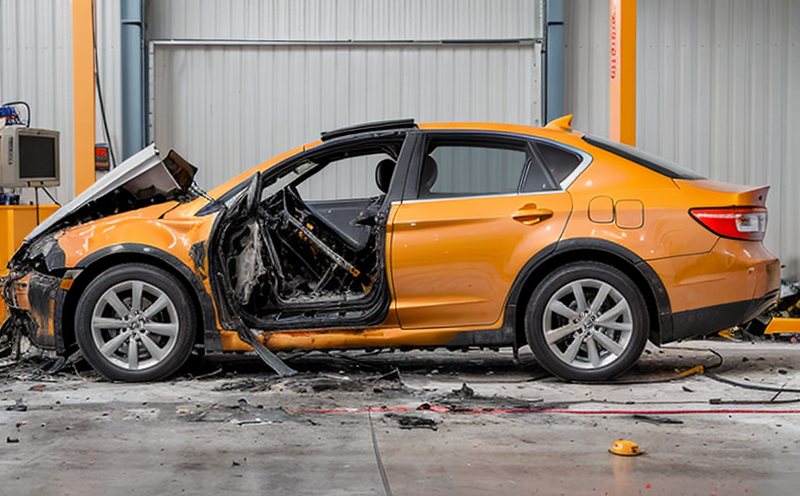Mechanical Abuse & Crash Testing
At Eurolab, our Mechanical Abuse and Crash Testing service is a critical component of ensuring the reliability, safety, and durability of batteries in various applications. This testing ensures that the battery can withstand harsh environmental conditions without compromising its integrity or performance. The process involves subjecting the battery to controlled mechanical abuse such as drop tests, vibration tests, and compression tests under specified standards.
The primary purpose of this service is to verify that batteries meet international safety regulations such as UN38.3, IEC 62133, and ISO 12405. These standards are crucial for ensuring the safe transport and use of lithium-ion batteries in various sectors including automotive, aerospace, and consumer electronics.
The testing procedures follow a strict protocol that includes pre-test preparation, during-test monitoring, and post-test analysis. Pre-test preparation involves charging the battery to its full capacity as per the specified standard. During the test, the battery is subjected to controlled abuse conditions such as drop heights of 150 cm onto concrete or steel surfaces, vibration frequencies up to 20 Hz, and compressive forces reaching up to 30 kN.
Post-test analysis includes visual inspections for cracks, deformations, or leaks. Additionally, electrical checks are performed to assess the battery’s internal resistance and voltage levels. If the battery fails any of these tests, it is deemed non-compliant with industry standards and may need further modifications or replacements.
The results of this testing are crucial for manufacturers and suppliers who want to ensure their products meet regulatory requirements before entering the market. By incorporating mechanical abuse and crash testing into their quality control processes, companies can significantly reduce the risk of product failures and associated liabilities. This service also helps in identifying potential weaknesses early on, allowing for timely improvements and innovations.
Our state-of-the-art facilities equipped with advanced instrumentation ensure accurate and reliable test results. Our team of highly skilled engineers and technicians guarantees that each test adheres strictly to international standards, providing peace of mind to our clients. With Eurolab’s Mechanical Abuse and Crash Testing service, you can rest assured that your batteries are thoroughly tested under real-world conditions.
Eurolab Advantages
- Comprehensive Test Capabilities: We offer a wide range of mechanical abuse tests including drop tests, compression tests, and vibration tests.
- International Compliance: Our testing adheres to international standards such as UN38.3, IEC 62133, and ISO 12405 ensuring compliance with global regulations.
- Advanced Instrumentation: Equipped with cutting-edge equipment that provides precise and accurate test results.
- Expert Team: Our skilled engineers and technicians ensure rigorous adherence to test protocols.
At Eurolab, we pride ourselves on delivering top-notch services tailored to meet your specific needs. With years of experience in the industry, our expertise is unmatched. We understand that every client has unique requirements, which is why we offer customized testing solutions. Whether you need a one-off test or an ongoing quality assurance program, we have the resources and capabilities to support you.
Our commitment to excellence extends beyond just meeting standards; it also includes providing detailed reports that explain the results of each test conducted. These reports are invaluable tools for understanding where improvements can be made and ensuring continuous quality improvement.
International Acceptance and Recognition
- UN38.3: This is a set of tests required by the United Nations for batteries intended to be transported by air. It covers various mechanical, thermal, and electrical abuse cases.
- IEC 62133: This standard defines the safety requirements for rechargeable small sealed prismatic or cylindrical lithium cells and batteries used in portable electronic equipment.
Mechanical abuse and crash testing is widely recognized across industries as a critical step towards ensuring product safety. Many international standards organizations have adopted these tests, making them mandatory for manufacturers looking to comply with global regulations. By partnering with Eurolab for your mechanical abuse and crash testing needs, you can ensure that your products meet the highest industry standards.
Our laboratory is accredited by reputable bodies such as ISO 17025, which ensures our services are conducted in a controlled environment meeting strict quality criteria. This accreditation not only adds credibility to our work but also demonstrates our commitment to providing accurate and reliable testing results.
Use Cases and Application Examples
| Use Case | Description |
|---|---|
| Automotive Industry: | Testing batteries used in electric vehicles to ensure they can withstand the stresses of road conditions, including bumps and potholes. |
| Aerospace Industry: | Evaluating batteries for use in drones or satellites where space is limited but reliability is paramount. |
| Consumer Electronics: | Assessing the durability of lithium-ion batteries used in smartphones and laptops to ensure they can handle daily usage without failure. |
| Agricultural Machinery: | Testing batteries for use in tractors and other heavy machinery to ensure they can operate reliably even under extreme conditions. |
| Medical Devices: | Evaluating the safety of batteries used in medical devices such as insulin pumps, ensuring they function correctly despite potential mechanical abuse. |
| Solar Energy Systems: | Testing backup batteries to ensure they can provide power during grid outages or harsh environmental conditions. |
The variety of applications highlights the importance of robust mechanical abuse and crash testing. Each use case demands specific test parameters tailored to its unique requirements, which underscores why this service is so vital across multiple sectors.
- Automotive: Focuses on durability under road conditions.
- Aerospace: Emphasizes reliability in space-constrained environments.
- Consumer Electronics: Ensures daily usability and safety.
- Agricultural Machinery: Guarantees operational reliability despite harsh conditions.
- Medical Devices: Prioritizes safety during mechanical stress.
- Solar Energy Systems: Ensures power supply under outage or extreme weather.
In each case, the goal is to identify potential weaknesses and ensure that the battery performs consistently across all scenarios. This comprehensive approach helps manufacturers produce safer and more reliable products, ultimately benefiting end-users.





